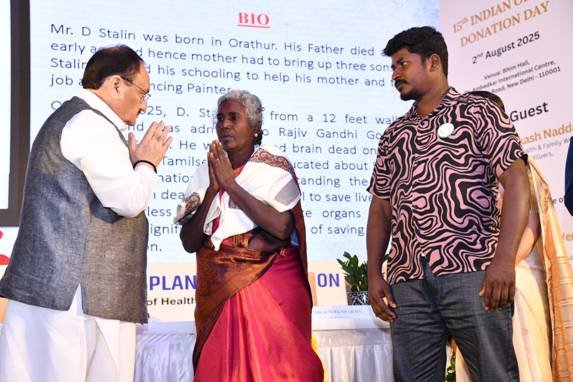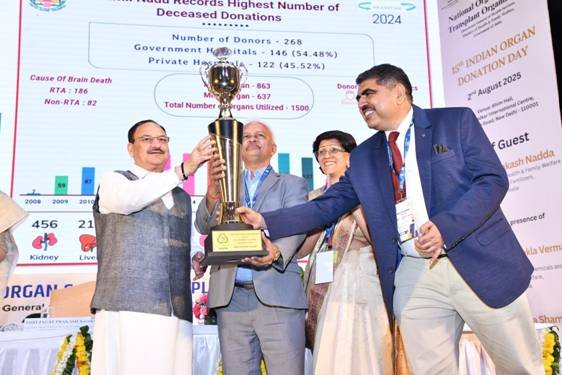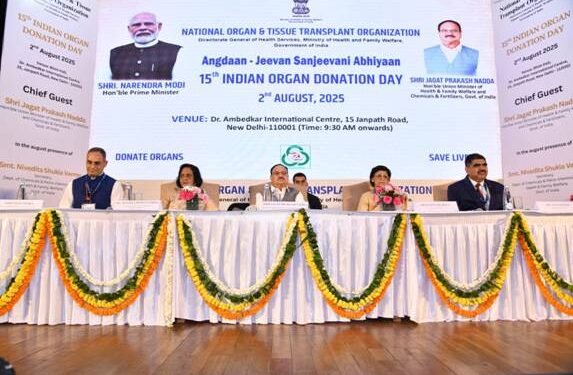New Delhi- India celebrated the 15th Indian Organ Donation Day with a sense of pride and renewed commitment as Union Health Minister Shri Jagat Prakash Nadda addressed a national gathering in New Delhi. Emphasizing the noble spirit of giving, he noted that organ donation represents one of the most profound acts of humanity and solidarity in modern medicine. He stated that the growing support for this cause signals a shift in public awareness and compassion, and the government remains dedicated to turning this movement into a people-driven campaign.
The event was organized by the National Organ and Tissue Transplant Organization under the Ministry of Health and Family Welfare at Dr. Ambedkar International Centre. It brought together policymakers, donor families, medical professionals, transplant recipients, and healthcare stakeholders. Shri Nadda acknowledged that the Aadhar-linked NOTTO online pledge portal, launched in 2023, has seen over 3.3 lakh citizens register as organ donors—reflecting a surge in public involvement. India recorded more than 18,900 organ transplants in 2024, the highest ever in a single year, up from less than 5,000 in 2013. India now ranks third globally in total transplants, behind only the USA and China, and leads in complex surgeries like hand transplants, showcasing its advanced medical capabilities.

The minister highlighted the gap between demand and availability of organs, attributing it not to reluctance but to lingering myths and lack of awareness. He called for more conversations, timely family consent, and a stronger support system for deceased donations. He stressed that one donor can save up to eight lives, underlining the life-transforming potential of organ and tissue donation. He noted that unhealthy lifestyles are among the major causes of organ failure and advocated preventive health measures like Ayurveda and Yoga to improve organ health and immunity. He encouraged the public to adopt Prime Minister Modi’s call to reduce oil consumption by 10% to build a healthier future.
To improve accessibility, the government provides up to Rs15 lakh in financial support for poor patients undergoing transplant surgeries under Rashtriya Arogya Nidhi, and Rs10,000 per month post-transplant for medical care. The Ayushman Bharat scheme also covers kidney transplants. Shri Nadda acknowledged the courage of donor families and the dedication of doctors, nurses, NGOs, and state authorities who make organ donation possible, urging citizens to turn this into a mass movement that upholds the spirit of Vasudhaiva Kutumbakam.
Acting Health Secretary Smt. Nivedita Shukla Verma paid tribute to the donors and recalled milestones in India’s transplant journey since the 1994 Transplantation Act. She pointed to the country’s low organ donation rate—less than 1%—while over 63,000 kidney and 22,000 liver patients await transplants. She stressed the need for timely organ donations from accident and brain stroke victims and called for village-level awareness under government efforts to expand donor registration, improve infrastructure, and build skilled manpower.
Director General Dr. Sunita Sharma saluted donor families as true heroes and emphasized that coordinated efforts are needed to bridge the demand-supply gap. She outlined the importance of stakeholder cooperation, better data management, and ethical organ donation practices.
The event saw the release of NOTTO’s Annual Report 2024–25, a new e-newsletter, and three awareness booklets focused on public education, Ayurveda and Yoga-based organ health, and best practices by states. Donor families, transplant recipients, and champions of the cause were felicitated for their inspiring contributions.

Awards were presented in various categories including Best ROTTO (North), Best State (Tamil Nadu), Best Union Territory (Puducherry), Best Northeast State (Manipur), and Emerging States (Odisha, Punjab, Rajasthan). Telangana was recognized for having the highest deceased donor rate. Among hospitals, Civil Hospital Surat won Best NOTTO-RC and KDRC-ITS Gujarat was declared Best Government Hospital. AIIMS Nagpur was named Emerging Institution and AIIMS Delhi’s Eye Bank was honored for excellence in eye donation. Madras Medical College’s brain death certifying team and individual contributors from Tamil Nadu also received special recognition.
An organ donation pledge was undertaken by attendees, reinforcing their commitment to the cause. The event concluded with a call to make organ donation a national movement and a message of gratitude to every individual and institution that contributes to saving lives.



